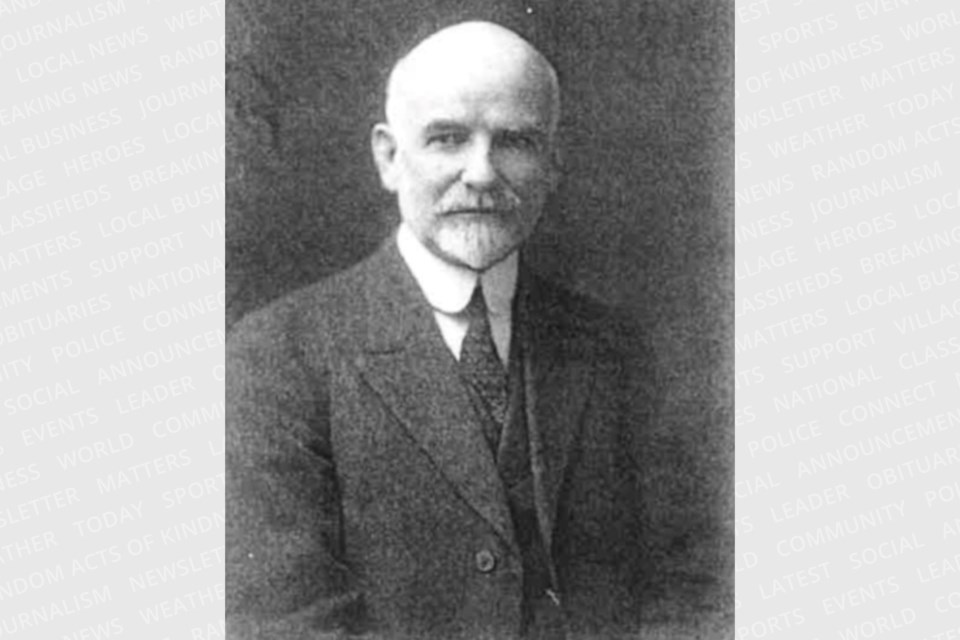At the start of the 20th century, the small city of Guelph had a world-famous institution, the Ontario Agricultural College (OAC). The OAC attracted students not only from across Canada and the United States, but from the United Kingdom, continental Europe and the far-flung lands of the British Empire.
One of the educators to whom the OAC owed its renown was professor Charles A. Zavitz.
Zavitz was born in 1863 to a Quaker family in the tiny community of Coldstream in Middlesex County, Ont. His parents strongly believed in the importance of education. Two of their sons attended American colleges, but Charles was sent to the OAC.
He excelled in his studies, and upon his graduation in 1886 the administration invited him to join the staff as a junior chemist. Zavitz enrolled in a new degree program introduced by the University of Toronto, and in 1888 was one of the five students in the first graduating class. The administrators appointed him assistant superintendent of experiments.
Thomas Edison once said genius is “one per cent inspiration and 99 per cent perspiration.” Zavitz fit the Edison definition. He was brilliant, tireless and meticulous in his work, and driven by a desire to help mankind.
By 1893 he was in charge of all field crop experimentation.
Zavitz employed already proven scientific methods of cross-fertilizing seeds from Britain and the United States to increase crop yields. He made innovations of his own to adapt crops to Ontario’s soil and climate conditions.
In 1904, the OAC made him head of the new Department of Field Husbandry.
Zavitz revolutionized agriculture in Ontario and eventually other regions of Canada. He pioneered the commercial production of soybeans in Ontario, and improved the crop yields of a long list of food staples including potatoes, sugar beets, peas and field beans, and fodder crops such as alfalfa. His greatest accomplishment came as a result of his work with grains, particularly barley.
Seven years of experimentation led to the development of a new variety of barley called OAC 21. It was soon being cultivated across North America.
As secretary of the Ontario Agricultural and Experimental Union, Zavitz encouraged thousands of farmers to experiment with seeds, fertilizers and new agricultural methods, and report their results. The information poured into his department, and then was shared for the benefit of all.
However, when Ontario tobacco growers approached the OAC, Zavitz opposed the idea of doing research on their behalf. As a Quaker, he abstained from the use of tobacco and alcohol. He felt the OAC’s resources should be used for food crops, not products that were harmful to health. Ironically, his OAC 21 barley proved to be ideal for brewing beer. Zavitz was embarrassed when the Canadian Brewers Association wanted to give him an award.
Zavitz’s religious principles made him a focus of controversy during the First World War. When OAC president Dr. Charles Creelman went to Australia on sabbatical in 1914, Zavitz filled in as acting-president. Canada was mobilizing for war, and Ontario Minister of Agriculture James Duff told the OAC to form an officer training corps. Zavitz didn’t comply. He was a pacifist and a founder of the Canadian Peace and Arbitration Society. He didn’t believe Canada should be militarily involved in the conflict. He offered his resignation as acting-president but Duff wouldn’t accept it.
Local members of the Conservative Party accused Zavitz of being unpatriotic. They demanded Duff accept his resignation and dismiss him from the OAC. Ontario farmers and the Toronto Globe came to Zavitz’s defense, as did many of his students. For months the “Zavitz affair” put Guelph in the headlines.
The furor subsided when Creelman returned and the OAC complied with Duff’s instructions.
Other institutions offered Zavitz positions at higher pay, but he chose to remain at the OAC. He continued his work there until he retired in 1927.
By the time of his death in 1942, Zavitz had received many honours, including an Honorary Doctor of Science degree from the University of Toronto. He has since been inducted into the Ontario and Canadian Agricultural halls of fame.
His former residence, now part of the University of Guelph, is called Zavitz Hall in honour of the Quaker who helped feed the world.



